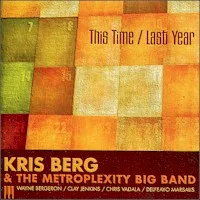Bitrate: MP3@320K/s
Time: 58:09
Size: 133.1 MB
Styles: Big band
Year: 2012
Art: Front
[6:53] 1. Softly, As In A Morning Sunrise
[5:48] 2. Games
[6:27] 3. This Time/Last Year
[6:10] 4. Forgotten Thoughts
[6:48] 5. Ru Chicken
[5:31] 6. The Gentle Rain
[6:50] 7. Pah-Dáh-Pah-Dah
[7:58] 8. Night Dreamer
[5:41] 9. I'm Okay, We're Okay
As Director of Jazz Studies at Collin College near Dallas, TX, award-winning bassist Kris Berg has vast experience teaching the music, directing various ensembles, as well as being founder of the annual Collin Jazz Festival and the Texas All-Star Jazz Camp. However, This Time / Last Year is his first project as bandleader, directing the large, twenty-plus-piece Metroplexity Big Band through nine electrifying orchestrations of originals and rearranged standards in the finest tradition of contemporary big band music.
Comprised of musicians from what Berg states are, "the crème de la crème of the jazz scene in the Dallas / Ft. Worth area, also known as the Metroplex," (from which the group's name is drawn), Berg harnesses the collective energy of some of the finest players in the business into a muscular ensemble on steroids. Special guests, trumpeters Wayne Bergeron and Clay Jenkins, trombonist Delfeayo Marsalis and flautist Chris Vadala, are the musical steroids helping to deliver that extra kick; that jolt, if you will, that makes this recording such a pleasure to hear.
The bassist delivers a fresh new arrangement of the Sigmund Romberg / Oscar Hammerstein classic, "Softly, As in a Morning Sunrise," featuring longtime friend Jenkins, and Marsalis, both doing the honors with solos in-between powerful brassy lines. The funk-infused "Games" originates from a composition for an old Berg fusion group and jumps out on electrifying chords from Dallas guitarist Noel Johnston and hard drum beats from Stockton Helbing, as Bergeron plays the lead. The funk continues on the original "RU Chicken," recorded with a smaller band, which takes the original melody of composer James "Pee Wee" Ellis's well-known "Chicken," and alters the rhythm to feature solos from electric pianist Kent Ellingson, a bit from tenor saxophonist Jeff Robbins, and more from Helbing.
Penned for wife Yvette, the title track features beautiful orchestrations, highlighting Helbing and former Maynard Ferguson band mate Ken Edwards on a sublime flugelhorn excursion. The Luiz Bonfa staple, "The Gentle Rain," is the soft spot of the recording, in an arrangement specifically designed to feature reed man Vadala on alto flute, to which Berg adds delicate ensemble work for an especially tender version of this standard. In an arrangement written specifically for vocalist Kurt Elling, who had been a special guest of Berg in the past, saxophonist Wayne Shorter's "Night Dreamer" turns into the defining chart of the recording, staying true to the melody but adding a full band intro with plenty of mutes, bass clarinets and flutes, ultimately featuring delicious solo spots from Jenkins and tenor saxophonist Brian Clancy.
The set ends on a big bang note with the lively and swinging "I'm Okay, We're OK!" and with that, Kris Berg and his Dallas area orchestra take a Texas-sized leap. This Time / Last Year is a classic big band album that features an array of excellent soloists on an impressive debut presented with a measure of funk, swing and swagger. ~Edward Blanco
Kris Berg: bass; Wayne Bergeron: trumpet (2, 4, 7); Clay Jenkins: trumpet (1, 3, 8); Chris Vadala: alto flute (6); Delfeayo Marsalis: trombone (1); Keith Jourdan: trumpet; Micah Bell: trumpet; Ken Edwards: trumpet; Jack Evans: trumpet (1, 3, 6, 8); Tyler Mire: trumpet (2, 4, 7, 9); Tim Ishii: alto saxophone, flute (1-4, 7, 8); Collin Hauser: alto saxophone, flute (1-4, 6, 9); Jeff Robbins: tenor saxophone, flute, alto saxophone (5, 6); Brian Clancy: tenor saxophone, flute; Kevin McNerney: baritone saxophone, tenor saxophone (6); Bruce Bohnstengel: alto saxophone, flute (3, 8, 9); Sarah Roberts: alto saxophone, flute, bass clarinet (6, 8); Michael Burgess: trombone; Chris Seiter (1-4, 6-9); Simon Willats: trombone (1, 3, 6, 8, 9); Milas Yoes: trombone (2, 4, 7); A.G. Robeson: trombone; Stockton Helbing: drums; Kent Ellingson: piano (1-5, 7-9); Roberto Verastegui: piano (6); Tom Burchill: guitar (1, 3-9); Noel Johnston: guitar (2).
This Time/Last Year




















